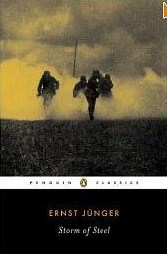Ernst Jünger
Storm of Steel

The First World War in person. One of the books where even the introduction is worth reading. I agree with Gide's words (as mentioned in Michael Hoffman's introduction of his translation):
'Storm of Steel', is without question the finsest book on war that I know: utterly honest, truthful, in good faith.'
I have to quote also a few more lines that I completely agree with, and explain better than any review what this book is about:
"Its contrast with most of the others is stark. It has no pacifist design. It makes no personal appeal. It is a notably unconstructed book. It does not set its author and his experience in any sort of context. It offers nothing in the way of hows and whys, it is pure where and when and of course, above all, WHAT. There is nothing in it about the politics of the war -nothing even on its outcome- and very little on the wider strategy of its conduct."
That sums it all pretty well for me. This is pure literature. The best memoirs I have read to date of any conflict (aside from Sledge's 'Of the Old Breed"). I couldn't help thinking of all the 'liquor-loving intellectuals' of the left bank of the Seine, who might have been drinking their narcissistic lives away in the cafés of Paris while Ernst Junger was creating this masterpiece of literature out of a real experience, and only a few miles away.
I can´t wait to read more by and about Ernst Junger.
The similarity with Homer'´s Iliad is not that far-fetching as you might think.
Oh, and if you just want to satisfy your prejudices by knowing in advance if this is a pacifist or a bellicist book, you might as well look elsewhere, because asking that question reveals you ain't ready for simply the truth, the 'real thing' like 'Storm of Steel' and better stick to your utopias.
